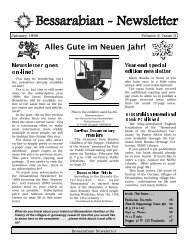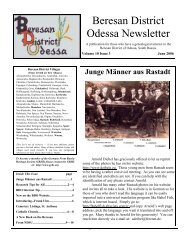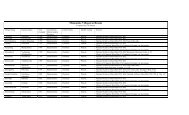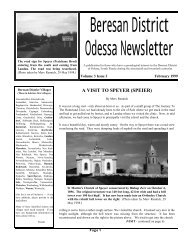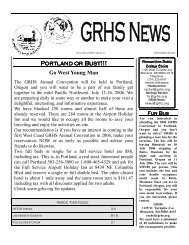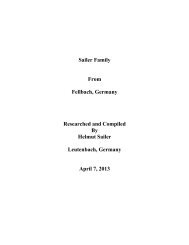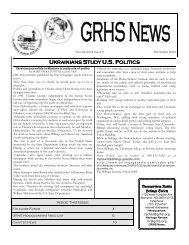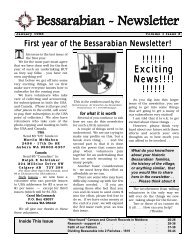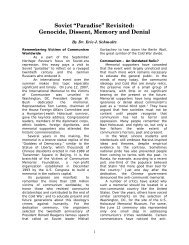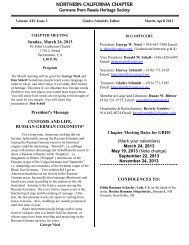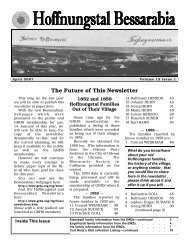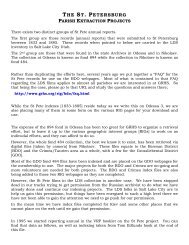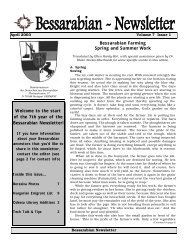Beresan District Odessa Newsletter - GRHS Home Page
Beresan District Odessa Newsletter - GRHS Home Page
Beresan District Odessa Newsletter - GRHS Home Page
Create successful ePaper yourself
Turn your PDF publications into a flip-book with our unique Google optimized e-Paper software.
Johannestal Church Building.<br />
(Photo taken by Gary Maier June 1996)<br />
<strong>Beresan</strong> <strong>District</strong> Villages<br />
(Those in bold are first villages.)<br />
Alexanderfeld, Alexandrovka,<br />
Annenthal, Annovka, Antonowka,<br />
Bagdanovka, Bendeerhof, Biswanje,<br />
Christina, Christofovka, Domaneveka,<br />
Dvorjanka, Eigengut, Felsenburg,<br />
Friedensdorf, Friedrichstal, Gaaregai,<br />
Gotta, Gradenfeld, Grise, Guldendorf,<br />
Halbstadt, Heck, Hoffnungstal,<br />
Hoffnung, Hoffnungsburg, Johannestal,<br />
Kantakusenka, Kapitanovka,<br />
Karlevka, Karlsruhe,<br />
Katharinental, Kavkas, Klein Karlsruhe,<br />
Klundovo, Kratovka, Landau,<br />
Lerisk, Lichtenfeld, Lubo-<br />
Alexandrovka, Manov, Marienfeld,<br />
Marlanavka, Michaelowka,<br />
Munchen, Navaselevka, Neu Karlsruhe,<br />
Neu Lustdorf, Neu Munchen,<br />
Neu Rohrbach, Neu Speyer, Neu<br />
Worms, Neusatz, Novo-Amerika,<br />
Novonikolajevka, Olgino, Otschakov,<br />
Petrowka, Pokrovskaja, Rastadt,<br />
Rohrbach, Rosenthal, Savidovka,<br />
Schlosser, Schmatz, Schonfeld, Sebastiansfeld,<br />
Selingera, Skarupka,<br />
Sjepucha, Speir/Speyer, Stadnaja-<br />
Bulka, Steinberg, Steingut, Stuttgart,<br />
Sulz, Swenigorodka, Vossessensk,<br />
Waterloo, Weidenberg, Wilhelmathal,<br />
Wolksov, Worms, Wowtsche.<br />
(this list is not all inclusive — if you<br />
have additions, please provide to the<br />
lead editor)<br />
Many of these identified chutors and<br />
villages need much research. If you<br />
have any background information on<br />
them, please share with us.<br />
Thanks<br />
<strong>Beresan</strong> <strong>District</strong><br />
<strong>Odessa</strong> <strong>Newsletter</strong><br />
A publication for those who have a genealogical interest in the<br />
<strong>Beresan</strong> <strong>District</strong> of <strong>Odessa</strong>, South Russia.<br />
Volume 4 Issue 3 February 2000<br />
Through the German Colonies<br />
of the <strong>Beresan</strong> <strong>District</strong><br />
<strong>Page</strong> 1<br />
by Herman Bachmann<br />
Translated by Roland Wagner<br />
(Editor’s note: This is a continuation from the last five issues of the <strong>Beresan</strong> <strong>District</strong> <strong>Odessa</strong> <strong>Newsletter</strong>.<br />
The June 1998 issue also contained the translator’s introductory comments. In summary, Herman<br />
Bachmann was involved in a scholarly research project of folk song and dialect literature. During the<br />
summer of 1927, he and Victor Schirmunski, a professor of German Language and Literature at the<br />
University of Leningrad toured the <strong>Beresan</strong> colonies, wandering from village to village collecting songs<br />
and stories and recording them. It is from these accounts that Bachmann wrote his book from which the<br />
following was taken.)<br />
Johannestal<br />
We drove to a village where I had spent part of my childhood and the first years of my youth.<br />
My father had once been a teacher there. When I was 10 years old I attended the same village<br />
school. When I was 15, I finished the Central School and returned to my parents. The hot<br />
flames of my first love were kindled in me at that age. Later while in the sixth class of<br />
Gymnasium, I spent a summer vacation in Johannestal. Every house, and yes almost every<br />
tree, had been familiar to me.<br />
How might it look now, after 20 years? What kinds of changes did war and revolution bring?<br />
I was filled with anticipation and curiosity. My thoughts flew from one memory to another. I<br />
peered sharply in the direction where the so-called “forest” should be, a strip of land planted<br />
with spikey acacia trees, which stretched along the eastern side of the village. It just didn’t<br />
appear, no matter how hard I looked. Finally the dark green seam slid into view on the distant<br />
horizon. That was it! Now the fantasy began to take effect, and one image after another began<br />
to emerge out of the archive of my memory.<br />
On this side of the forest, beneath shady branches, the boys of the village had their dance place<br />
back then. There, as a 16 year-old, my soles pounded out the rhythms of the first colonial<br />
waltzes and polkas. The dance-ground [“Tanzbodde”] was a round, dark piece of earth,<br />
(BACHMANN - continued on page 4)
<strong>Newsletter</strong> Line-up<br />
Lead Editor Merv Rennich / R060<br />
Assistant Editor Carol McCormack /M150<br />
Assistant Editor Roland Wagner / W011<br />
Assistant Editor Dale Lee Wahl / W078<br />
Subscriptions Arletta Baskins / B115<br />
Archives:<br />
Maps Jeff Hatzenbeller<br />
Village Coordinators:<br />
Felsenburg George Hoff / H072<br />
Guldendorf Curt Renz / R022<br />
Johannestal Carol Fuchs / F061<br />
Johannestal Ray Heinle<br />
Landau Diane Wandler / W090<br />
Landau Zita Gieser<br />
Neu Lustdorf Elsie Heuther / H008<br />
Neusatz Ken Aisenbrey / A013<br />
Rastadt Diane Wandler / W090<br />
Rastadt Letty Schoch / S193<br />
Rohrbach Arletta Baskins / B115<br />
Rohrbach Rosemarie Dinkel / D022<br />
Rohrbach Nancy Schroeder<br />
Rohrbach Ed Schulz / S043<br />
Rohrbach Lucy Simpson / S046<br />
Speier Albert Berger<br />
Speier Valerie Ingram / I009<br />
Stuttgart Ruth Iseminger<br />
Sulz Albert Berger<br />
Sulz Valerie Ingram / I009<br />
Waterloo Betty Rennich / R103<br />
Waterloo Lucy Simpson / S046<br />
Worms Arletta Baskins / B115<br />
Worms Nancy Schroeder<br />
Worms Ed Schulz / S043<br />
Worms Lucy Simpson / S046<br />
Worms Dale Lee Wahl / W078<br />
(The addresses for most of the Editors and most<br />
of the Village Coordinators can be found in the<br />
latest issue of the <strong>GRHS</strong> Der Stammbaum.)<br />
Dues Are Due<br />
The next issue of the BDO newsletter (June<br />
2000) will start the fifth year of publication.<br />
Make sure you receive all the issues by renewing<br />
your subscription. See details for renewal<br />
on the back page of this issue.<br />
<strong>Beresan</strong> <strong>District</strong> <strong>Odessa</strong> <strong>Newsletter</strong> - Volume 4 Issue 3: February 2000<br />
�� LETTERS<br />
Sharon Schulz Kroker<br />
<br />
I read with great interest the article, The Schmierers of Worms, written by George<br />
Schmierer of England.<br />
You see, both of my paternal grandparents and previous generations are from<br />
Worms. In addition, my great-grandmother was Christina Schmierer Schulz. I<br />
am currently working on the Schmierer family tree and am trying to figure out<br />
Christina’s father’s history. Jacob Schmierer appears to have had 2 or 3 wives.<br />
Do you know if someone has a family tree done for the Schmierers of Worms?<br />
Also, I am wanting to know what religion the Schmierers were as Jews I know<br />
keep telling me this is a Jewish surname. Many of my other family names, Schulz,<br />
Goetz, Zoller, Suess seem to be Jewish names as well. Any insight into the<br />
Schmierers’ family and families in Worms in general regarding religion or<br />
ethnicity would be appreciated.<br />
Now that I am doing genealogy, my father has asked me for the names of his<br />
(approximately 100) first cousins. These people would be the grandchildren of<br />
either Wilhelm and Christina (Schmierer) Shulz who settled in Streeter, North<br />
Dakota about 1902/2 or Johann and Christina (Zoller) Schwenk who settled in<br />
Ventura, North Dakota about 1904. Would any of your readers have information<br />
for me?<br />
Elaine Morrison<br />
2525 Taft Drive Apt. 802<br />
Boulder CO 80302-6824<br />
<br />
<strong>Page</strong> 2<br />
�����<br />
When the BDO group was organized, I volunteered to be the coordinator of the<br />
village plot maps. Note that this not the <strong>Beresan</strong> <strong>District</strong> map project which deals<br />
with the entire district. We are concerned only with plat maps of the German-<br />
Russian villages. We have access to a few plat maps, but wonder if there might be<br />
others out there somewhere.<br />
The ones that we know of, or have copies of, are: Karlsruhe, Katharinental,<br />
Landau, and Rastadt. These four may be seen in “Paradise on the Steppe” by<br />
Height.<br />
Other plat maps that we have are: Speyer, Worms, and Felsenburg.<br />
Do you know of others? Please let me know.<br />
�����<br />
(LETTERS - continued on page 3)
LETTERS - continued from page 2<br />
Ruth Iseminger<br />
P O Box 80814<br />
San Marino, CA 91118-8814<br />
<strong>Beresan</strong> <strong>District</strong> <strong>Odessa</strong> <strong>Newsletter</strong> - Volume 4 Issue 3: February 2000<br />
I have a special interest in Stuttgart because my great great<br />
grandfather was one of those who left Germany and was directed<br />
to Stuttgart. My great grandfather, Samuel Ehret, was born there<br />
in 1822. The Ehret family moved to Guldendorf when Stuttgart<br />
was closed and in 1849 Samuel Ehret brought his family to the<br />
United States. They were one of the families in the Ludwig Bette<br />
group which came to the United States before the larger groups in<br />
the 1870s.<br />
I have very little information about this village, probably because<br />
it existed less than 10 or 12 years. As Village Coordinator I am<br />
looking for whatever information is available about Stuttgart.<br />
Jim Gessele<br />
<br />
�����<br />
Anyone with North Dakota roots or any researcher looking for<br />
information on North Dakota place names may be interested to<br />
know that Douglas Wick’s “North Dakota Place Names” is back<br />
in print. This book is an individual resource in locating obscure<br />
rural communities and post offices that are not to be found on<br />
current maps.<br />
For more information contact Douglas Wick at<br />
.<br />
Gordon Herrboldt<br />
<br />
�����<br />
Regarding the article, page 11, “Research Outline for Germany”.<br />
Is there an e-mail address for the LDS Research Outline: No<br />
e-mail address was included with this article found in the October<br />
(1999) issue.<br />
(Editor’s note: We are embarrassed and apologize to everyone<br />
about the site address not being included in the newsletter. Here<br />
is the address:<br />
http://www.familysearch.net/sg/Germany.html<br />
Thanks for bringing this to our attention.)<br />
�����<br />
<strong>Page</strong> 3<br />
Joe Thustenson<br />
Siloam Springs, AR<br />
I’ve heard there is the possibility of purchasing an 1852 and<br />
1892 census on Worms, S. Russia. Can anyone give me some<br />
direction on accessing this information?<br />
Reply by Dale Wahl: There is an 1892 census available from<br />
AHSGR.<br />
We have one for Worms 1858 which was just published. Both<br />
<strong>GRHS</strong> and AHSGR is selling them for the same price as it has<br />
been a joint effort. You can see the 1858 census that have so far<br />
been made available at this URL:<br />
http://www.grhs.com/Neword.html<br />
It can be noted that the price for non-members is much greater<br />
than for members - members have paid to bring the files back<br />
so we could make them available to folks.<br />
The 1858 census project has completed about 2/3s - 3/4s of<br />
those in hand - all are of the <strong>Odessa</strong> area . . . and the other 1/4<br />
- 1/3 will be posted to the <strong>GRHS</strong> homepage at the URL<br />
reflected above when they are ready.<br />
For those who not have the ability to view the homepage, here<br />
is the status of the <strong>GRHS</strong> Clearing House 1858 Census Project.<br />
Completed and ready: Alexanderhilf, Franzfeld, Gluechstal,<br />
Gueldendorf, Helenental, Johannestal, Josephstal, Karlsruhe,<br />
Katherinental, Klein Liebental, Landau, Lustdorf, Mariental,<br />
Neudorf, Neu Freudental, Rhorbach, Speir, Sulz, Waterloo, and<br />
Worms.<br />
Still being worked on: Freudental, Grossliebental, Hoffnungstal*,<br />
Kassel*, Neuburg, and Peterstal. (* - 1858 version<br />
in Stumpp book and these are on the back burner a bit but will<br />
be also available to the memberships in the same form.)<br />
�<br />
A Genealogists Prayer<br />
Lord, help me dig into the past and sift the sands of time,<br />
That I might find the roots that made this family tree of mine.<br />
Lord, help me trace the ancient roads on which my fathers trod,<br />
And led them through so many lands to find our present sod.<br />
Lord, help me find an ancient book or dusty manuscript<br />
That’s safely hidden now away in some forgotten crypt.<br />
Lord let it bridge the gap that haunts my soul when I can’t find<br />
The missing link between some name that ends the same as<br />
mine.<br />
Written by: Curtis Woods
BACHMANN - continued from page 1.<br />
stamped out by the dancers, on which grass no longer grew. The<br />
young men and women, of 16 to 20 years of age, gathered there<br />
every Sunday afternoon. The musician sat on a tree stump, with<br />
his accordion [“Blosbälgle,” as the colonists called this instrument]<br />
resting on his crossed leg. He was the most respected and<br />
highly regarded person in the whole group, since without his art<br />
there would be no dancing fun. Usually there was also a less<br />
talented musician available who occasionally relieved the main<br />
performer, and also gave him the opportunity to throw himself<br />
into a whirling, bounding-waltz [“Hopserwaltzer”] with his<br />
sweetheart.<br />
The boys stood or sat on one side of the dance place, the girls on<br />
the other. The musician played a brief cadence and then the first<br />
fiery waltz began. One of the oldest boys stepped forward and<br />
gave a signal with his finger to the girl he selected, usually also<br />
calling out her name. The selected one stepped forward, the<br />
dancer put his right arm around her waist, she placed her left<br />
hand on his right shoulder, the fingers of their free hands were<br />
entwined like a gable, the pair made a swaying motion of their<br />
bodies, the dancer stomped heartily on the earth and the circular<br />
movement began with such force that the long and broad dress<br />
of the girl spread itself out like an expanded umbrella. The first<br />
dancer was followed by a second, and so on, until the entire<br />
dance ground was densely filled with the bouncing hats of the<br />
boys and the fluttering head scarves of the girls. Bright<br />
“Jucche” calls and throat-trills further bolstered the festive<br />
mood. After a quarter hour the scent of sweat from the heated<br />
youths was already detectable from a distance.<br />
If a young visitor from a neighboring village happened to show<br />
up, he was included in the following manner: an older dancer<br />
sought out one of the prettiest girls, who was considered to be a<br />
good dancer, did a few waltz loops with her, then turned her<br />
over to the guest.<br />
The dancing fun usually lasted until the cow-herder returned<br />
near the village. The shout from one of the girls, “the cowherder<br />
comes,” was enough to immediately bring all the other<br />
girls to a halt.<br />
Sometimes the dance-hours were accompanied by the rich pleasure<br />
of wine (the girls excluded). That often led to roughhousing,<br />
which brought the fun to an early end and many a boy<br />
come back with a bloody nose or blue marks under the eyes. The<br />
cause of such physical acting out was usually something trivial:<br />
an overly stimulated critic scarcely had to make a joking remark<br />
to a comrade in a heightened mood, and the foundation stone<br />
was laid.<br />
While these images of dancing were surfacing in my memory<br />
and unfolding in their original clarity, we had meanwhile drawn<br />
up close to the forest. I now spotted the famous baptismal pond.<br />
<strong>Beresan</strong> <strong>District</strong> <strong>Odessa</strong> <strong>Newsletter</strong> - Volume 4 Issue 3: February 2000<br />
<strong>Page</strong> 4<br />
View of Johannestal.<br />
(Photo taken by Gary Maier June 1996)<br />
Here I once attended a baptismal immersion. The initiates stood<br />
in their long, white shirts, prepared and looking forward to the<br />
moment when they would be immersed. They had to wait<br />
because their baptist, a fanatic preacher, wanted to use the<br />
opportunity of having so many people present to deliver a fiery<br />
sermon for his religion. He climbed onto a wagon, waved the<br />
Bible over his head, opened it and read a verse with a loud,<br />
shrieking voice. Then he looked at the crowd as if he wanted to<br />
hypnotize them with his sharp eyes and spoke with the same<br />
powerful tone in his voice, something like the following: “Dear<br />
brothers! The word ‘baptize’ [Taufe’] is not a German word,<br />
but rather Greek, the language in which our Holy Scriptures<br />
were originally written. The Lutherans and other Christians<br />
have distorted this word and interpreted it completely falsely. It<br />
means ‘immersing under.’ Only we Baptists adhere strongly to<br />
the Word of Christ and fulfill His Commands exactly. We<br />
immerse our believers completely under the water and don’t just<br />
sprinkle them on the forehead, as the Lutherans do. By doing<br />
that we are on the right path, not like them. Beloved in the<br />
Lord! May you properly baptize, that means to immerse, if you<br />
wish to be pleasing to the Lord our God!”<br />
I couldn’t follow the preacher any further, since I was forced<br />
aside by the milling crowd and I pushed over to the edge of the<br />
table in order to see the truly baptized with my own eyes.<br />
A group of young boys had assembled in a semi-circle at the<br />
dam on the edge of the pond. They also waited for the big<br />
moment. It didn’t take much longer. The preacher, wearing a<br />
black robe, stepped into the water, the believers followed and<br />
placed themselves in two rows beside him. He stepped to the<br />
first one, raised his hand in blessing, then pushed him over with<br />
both arms and dunked him backwards in the water, making the<br />
water splash. The baptized one didn’t seem to especially enjoy<br />
the dunking, since he puffed loudly, rubbed both hands on his<br />
face and shook himself like a wet hen.<br />
“What is he thinking at this moment?” I asked myself.<br />
(BACHMANN- continued on page 5)
BACHMANN - continued from page 4<br />
As if all had been coached, each initiate repeated the same<br />
noises and motions. The attention of the crowd was soon<br />
drawn by a small group of youths who were assembled at the<br />
dam and who were gradually getting louder and louder. With<br />
all sorts of comments, loud calls and laughter, they imitated the<br />
motions of the baptized. Finally one of the fathers of the<br />
initiates strode up to them and in an admonishing voice said:<br />
“Boys, don’t you understand anything? Why are doing this<br />
yelling? Don’t you believe in God any more?!” [“Buwe, hen<br />
ihr kai Verstand net?! Was machener do fer e Gejohl?!<br />
Glawen ihr an kor Gott meh?!”]<br />
We then drove into a side alley in the village. Between the edge<br />
of the forest and the courtyards of the first rows of houses, there<br />
lay the Weinberg. Here, as an eleven year-old boy, along with<br />
my comrades, I had once worked as a “Stupfler.” This job<br />
consisted of searching through the rows of vine-stalks after the<br />
grape harvest, looking for remaining clusters of grapes. I had<br />
the great good fortune of discovering an entire cluster of grapes<br />
within the leaves of one stalk. After a strict order was established,<br />
each of my comrades was allowed to pluck one grape<br />
and to consume it, and we continued doing this until the last<br />
one had been swallowed. Never had wine grapes tasted as good<br />
as these “gestupfelten” ones. For months afterward this find<br />
was the most interesting topic of our Sunday conversations.<br />
To the right of the entrance alley, below the vineyard, two<br />
windmills once stood, one made of wood and the other of stone.<br />
The first had disappeared without a trace, and the only thing<br />
that remained of the second one was a half fallen stone tower,<br />
which resembled a medieval fortress in appearance. I<br />
regarded this as a good sign of progress for the residents of<br />
Johannestal. It meant to me that they had made the transition<br />
to better forms of industry, away from the use of the fickle<br />
winds to the utilization of steam-power.<br />
Our woman driver got closer to the center of the village. The<br />
church rose steeply before our eyes. It stood there, separate<br />
from the rows of houses. I sized it up sharply. At first it<br />
seemed unchanged to me. But then I soon noticed that the<br />
steeple had become gray looking.<br />
Who did that, little church? Has your unfaithful “flock”<br />
[“Schäflein”] caused so much tribulation? Do you perhaps<br />
tremble at the orders of the village council, or is it the new free<br />
Soviet school, where it is not permitted to talk about you? It is<br />
said that your heart was already broken from sorrow. Yes, that<br />
is true, really true! The next day I perceived it with my own<br />
ears: the large clock had received a deep crack and its tones<br />
resounded no more, so satisfyingly and confidently like in the<br />
“good old days.”<br />
We drove to the school courtyard. The teacher’s residence was<br />
closed. I heard a crashing sound in the school building and<br />
<strong>Beresan</strong> <strong>District</strong> <strong>Odessa</strong> <strong>Newsletter</strong> - Volume 4 Issue 3: February 2000<br />
<strong>Page</strong> 5<br />
went inside. There were two men. One was wearing a blue<br />
apron and doing something with a bucket of clay, while the<br />
other was working on a window. I recognized the latter one as<br />
my old school comrade. However, he looked at me without<br />
recognition. After I asked him something, in order to make<br />
him think back, he happily grabbed my hand and shook it<br />
warmly. I asked him about the residence of the second teacher,<br />
went back to our wagon, and we drove across the wide street.<br />
People talk about the Johannestal street everywhere in the<br />
region. “But they have such a broad street,” say the Rohrbachers<br />
[“Hä die ower ä präti Goß”]. — “Their street is very wide,”<br />
declare the people of Worms [“Denne iere Gaß isch ahrich<br />
breet”]. The Johannestal Swabians nod at that and answer:<br />
“Yes, its true, we have a very wide street” [“Ja, ‘s isch wohr,<br />
mir hen e arig broite Gaß]. 2<br />
There is an explanation for this width. Supposedly it is due to<br />
the first women in Johannestal, who were by nature very<br />
quarrelsome. In order to cut down on the shouting and<br />
quarreling the founders of the village laid the rows of houses so<br />
far from each other that the women’s voices couldn’t reach the<br />
courtyards on the opposite side of the street.<br />
We met the teacher, a pleasant young fellow, at his house.<br />
Since he resided in only a single room, he spoke with the<br />
landlord about putting us up. He claimed that the landlord was<br />
my school comrade, that the two of us had once sat together on<br />
the same bench, and that I should also be able to remember the<br />
landlord’s wife. We were received warmly and well taken care<br />
of. The host proved to be a suitable linguistic informant for the<br />
professor, and the teacher arranged for a number of boys and<br />
girls that evening.<br />
The summer-kitchen was arranged as a gathering place. When<br />
darkness set in, a large chorus group had assembled. The<br />
professor and I discovered that Johannestal offered the most<br />
song material of all the colonies that we had visited up to that<br />
point. The boys not only knew many songs, they also remembered<br />
them very well and performed them beautifully. We<br />
recorded many on the gramophone. We delayed recording any<br />
further melodies for awhile. But then it was difficult for us to<br />
find a singer for that purpose, since the next day all the boys<br />
had business to attend to. Finally we came to an agreement<br />
with the lead singer: for a ruble, he declared that he was<br />
prepared to sing for me an entire day.<br />
He was already there by 8 o’clock the following morning. We<br />
went to a distant room and began our work. He performed his<br />
___________________________<br />
2 Bachmann is playing on the various dialects used in the<br />
colonies, noting the various ways that people say “broad”<br />
[“präti,” “breet,” “broite”]. The Johannestal people speak a<br />
Swabian dialect, and thus he refers to them as “Johannestaler<br />
Schwabe.”<br />
(BACHMANN - continued on page 6)
BACHMANN - continued from page 5<br />
songs with a powerful and high voice. I advised him to spare his<br />
voice, so that he could hold out longer. However, he insisted<br />
that he could only sing in the “proper” tone and that he wasn’t<br />
afraid of wearing himself out. After an hour I said that we<br />
needed to take a break and he seemed satisfied with that.<br />
Towards noon his voice became raspier and fainter and he had<br />
to cough several times. After three hours of work I asked him<br />
how he felt and he said: “You can also get tired from singing.”<br />
After a two hour break for lunch we continued. It kept getting<br />
worse and more difficult, and finally we stopped: the singer had<br />
physically sung himself out.<br />
“I didn’t think it would be so hard to earn a ruble,” he said, after<br />
we were finished. “I didn’t think singing could be any work,”<br />
he added [“des han ich net denkt, daß der Ruwl so schwer zu<br />
verdiene isch. Ich han gmoint’s Singe wär gar koi Arwet net”].<br />
I had the feeling that 100 years from now the descendants of the<br />
singer would still be talking about how their forefather once<br />
earned a ruble by singing.<br />
(Editor’s note: In the next issue we will continue with the last<br />
installment of Roland Wagner’s translation of Herman Bachmann’s<br />
book “Through the German Colonies of the <strong>Beresan</strong><br />
<strong>District</strong>” and his visit to Rohrbach and Worms.)<br />
<strong>GRHS</strong> Archives Acquisition<br />
by Dale Wahl<br />
We have had some favorable break throughs with some of our<br />
<strong>GRHS</strong> Archives Acquisition efforts.<br />
The “Welfare Committee” records in Fond 6 at the <strong>Odessa</strong><br />
archives has been of great interest to us for many years. However,<br />
until recently we have not had access to the archives, and<br />
then when we did get access to the archives, the Fond 6 was not<br />
available to us.<br />
Now that it is available, we are still lacking in that we do not<br />
have visibility of the contents in this extremely large collection<br />
of files - we just have not had a “catalog” so to speak.<br />
The reason the collection (Fond 6) was closed for so long is that<br />
there was an inventory being made up. That inventory has now<br />
started to be published, but it is in Russian/Ukrainian so we still<br />
cannot ‘see’ the catalog.<br />
The first two books for the Fond 6 inventory takes us up and<br />
through about 1818 in book 1 and in book 2 it takes us up and<br />
through about 1826-28. A most important period of time for<br />
<strong>Beresan</strong> <strong>District</strong> <strong>Odessa</strong> <strong>Newsletter</strong> - Volume 4 Issue 3: February 2000<br />
<strong>Page</strong> 6<br />
most of us.<br />
The <strong>GRHS</strong> Archives Acquisition Committee has made a deal to<br />
have these two books translated into a functional list so we can<br />
gain that ‘catalog’ for the members of the various teams/committees<br />
working under the <strong>GRHS</strong> for Archives Acquisition -<br />
Records Retrieval “coordinated” efforts.<br />
Once these teams/committees can gain that ‘catalog’ in a form<br />
they can use, you will see us at BDO and the other groups<br />
getting excited about what we might be able to work out to help<br />
us in our research efforts. For right now, we do not need any<br />
great influx of donations to the BDO RR funds, but folks can<br />
continue to give as they desire in preparation of our efforts. We<br />
will keep folks appraised as to what we are up to and when and<br />
if we need additional funds to be able to go after more BDO<br />
records.<br />
Past Due Crown Debts<br />
Sometimes there are “stray” documents found that just kind of<br />
hang there by themselves. This “Past Due Crown Debts” notice<br />
is one of them. The value of the document is not immediately<br />
apparent but some day it may make better sense.
Sutton Nebraska<br />
and<br />
<strong>Beresan</strong> <strong>District</strong> <strong>Odessa</strong> Settlers<br />
Part III<br />
(Editor’s note: Part 1 appeared in the February 1999 issue and Part II<br />
in the June 1999 issue of this newsletter.)<br />
Migration of the First Russian<br />
Germans to Dakota 1<br />
By Friedrich Mutschelknaus<br />
(1852-1929)<br />
At the beginning of the 70’s in the last century, there was much<br />
unrest in the German colonies in Russia. The Germans had<br />
been given the promise by Empress Catherine that they would be<br />
exempt from military service as long as the sun and the moon<br />
remained in the heavens. This privilege was terminated with<br />
widespread unrest resulting.<br />
Old Johannes Sailer said to us in Johannestal, “No, I’ll never be<br />
a soldier. And no claw will I leave here.” By that he meant his<br />
sons, as he had seven of them.<br />
Thereupon as exchange of letters with his brother-in-law Ludwig<br />
Bette in America began. Ludwig Bette and August Scheller<br />
had migrated from Johannestal to America around the year 1849<br />
and, on an island near Sandusky, Ohio, operated a vineyard,<br />
becoming well-to-do. Twenty-one other families had migrated<br />
to America at that time with Bette and Scheller. If all were from<br />
Johannestal, I am unable to say. It may have been in the last<br />
days of June or in the first days of July, 1872, that Ludwig Bette<br />
arrived in Johannestal from America, visiting his brothers-inlaw<br />
Johannes Sailer and Jacob Steiger. Following discussions<br />
with him, four families pledged themselves to migrate to America.<br />
They were his brothers-in-law Johannes Sailer and Jacob<br />
Steiger, Michael Schatz and Matthaeus Sailer, the son of Johannes.<br />
At this time numerous gatherings were held at which<br />
many people were present. Firstly, many were happy to see this<br />
old acquaintance again, and secondly, they were also inquisitive<br />
to learn about America.<br />
<strong>Beresan</strong> <strong>District</strong> <strong>Odessa</strong> <strong>Newsletter</strong> - Volume 4 Issue 3: February 2000<br />
The czarist government naturally looked upon the presence of<br />
Ludwig Bette with a jaundiced eye. He was also the guest in the<br />
country of various landowners, and it is possible that he incautiously<br />
made unfavorable comparisons between the United States<br />
and Czarist Russia.<br />
____________<br />
1<br />
In the German form on 11 November and 18 November 1924 in the<br />
Dakota Freie Presse of New Ulm, Minnesota. Translated to this<br />
English version in an article by Theodore C. Wenzlaff in Volume 49<br />
Section 3, (page 383) of the Nebraska State Historical Society Magazine<br />
- 1968.<br />
<strong>Page</strong> 7<br />
Then one day it was reported that the authorities were looking<br />
for him for stirring up the people. Of course the officials<br />
thought it would be easy to arrest him for, as an American, he<br />
was easily recognizable, wearing a tailored suit and a cylinder<br />
hat. But good friends helped him. The cylinder hat was<br />
hurriedly discarded and a cap substituted, such as we wore, and<br />
his fine clothes were exchanged for German farmer clothes.<br />
Friends hustled him to the border, and then one day we heard<br />
that Ludwig Bette was gone.<br />
The above named four families sold their crops, though even yet<br />
standing in the fields. Because they were the first to leave, they<br />
encountered many difficulties in obtaining passports. Robert<br />
Levi, the church secretary, first had to write out the application<br />
and other papers, and it was necessary to go to Nikolajew, to<br />
<strong>Odessa</strong> and even to the city of Cherson, to obtain the necessary<br />
papers from the authorities. It took so much time that these first<br />
emigrants had left only a short time before the departure of a<br />
second party.<br />
To the second party belonged my father Jacob Mutschelknaus,<br />
Gottlieb and Ludwig Sailer, sons of old Johannes Sailer, Gottfried<br />
Mehrer and others whose names I cannot recall. From<br />
Rohrbach, there were the families of Peter Moos, Adam Zimbelmann,<br />
Jacob Huber and others; from Worms there were Jacob<br />
and Johann Kusler and others. This second party, before<br />
leaving, reaped their crops, threshed and sold them, and sold or<br />
auctioned off their belongings.<br />
On the 17th of October, 1872, the second party left Johannestal<br />
to board the train at <strong>Odessa</strong>. It was a beautiful autumn day; only<br />
our hearts were sad. Especially for me, Friedrich Mutschelknaus,<br />
and for my parents-in-law, Gottlieb Delzer. On the 3rd of<br />
October of that year, I had been married, and now we were<br />
making the long trip to America. My parents-in-law had only<br />
one thought, that they would never again see their daughter<br />
Caroline.<br />
“She is leaving and I’ll never see her again!” So said my<br />
father-in-law. But he was wrong for in September, 1874, my<br />
parents-in-law also came to America.<br />
On the evening of the 18th of October, we arrived in <strong>Odessa</strong>,<br />
and on the following morning, at about 7:00 o’clock, we boarded<br />
the train for Germany. It took about three days until we arrived<br />
at Hamburg where we stopped off for two days. Next a steamboat<br />
took us to Hull on the east coast of England. The North Sea<br />
was very lively, giving us our first experience with seasickness.<br />
From Hull we went to Liverpool by train.<br />
On a Saturday evening, at about 7:00 o’clock, we arrived in<br />
Liverpool where we had to wait four days until we were driven<br />
to a large ocean liner. Up to now the trip had been tolerable.<br />
But after we had steamed three days and three nights toward the<br />
(SUTTON - continued on page 8)
Sutton - continued from page 7<br />
west, we encountered terrible storms. Doors were fastened<br />
securely so that no one could go out on deck. High waves swept<br />
over the ship, damaging it extensively. Much of the superstructure<br />
was torn from the deck, and finally the propeller was so<br />
damaged that it could no longer be used.<br />
It was for us during that awful night as it was for the tribe of<br />
Israel in the Wilderness, and all our people cried out in their<br />
anguish and fright. “There were no graves for us in Russia; we<br />
had to come here to drown.” But where one’s misery is the<br />
greatest, there God’s help is the nearest. No one drowned and<br />
the storm calmed itself. Because the ship was damaged too<br />
extensively, it could no longer proceed and must, therefore, turn<br />
around even though at night. When we came on deck the next<br />
morning, we saw that instead of proceeding toward the west, we<br />
were going toward the east. Because the machines could not be<br />
used, the ship had to set sails. The return to Ireland required six<br />
days and nights.<br />
We had to wait three days in the Irish port until another ship<br />
arrived. Then there was another delay of three days to transfer<br />
the stores of the ship, and on the fourth day we were again ready<br />
to sail toward the west. Because we again encountered high seas<br />
throughout the onward voyage, we were a total of thirty-six days<br />
on the water.<br />
Early in December, we arrived safely in New York. On account<br />
of the shipwreck, we had lost so much time that a third party<br />
leaving from Johannestal had passed us and was already on the<br />
way to Sandusky, Ohio, by the time we arrived in New York. In<br />
the third party were my uncle George Jasmann, George’s son<br />
Christian Jasmann, Henry Sieler, Dominic Stoller and others.<br />
“Where do you wish to go?” we were asked in New York. But<br />
we were strangers in this country and did not know ourselves.<br />
We were told that others of our people had preceded us and had<br />
gone to Sandusky, Ohio, so we decided, too, to go to Sandusky.<br />
We arrived in Sandusky some time between the 10th and 15th of<br />
December, 1872. This was a large manufacturing city, so we<br />
found enough empty lodgings to accommodate us.<br />
Because no report of us had been received, those at home in<br />
Johannestal thought nothing else than that we had drowned in<br />
the ocean. As soon as we arrived in Sandusky, I wrote a letter to<br />
my parents-in-law. This letter was the first evidence of our safe<br />
arrival which those in our homeland received, and interest in it<br />
was so great that Pastor Birnbach read the letter from the pulpit<br />
so that all Johannestal would know of our safe arrival.<br />
Sandusky was a large city even then. Even as many families as<br />
we were, we found good lodgings for all. We younger men soon<br />
found employment and worked for wages by the day, and the old<br />
men would assemble, smoke their pipes and hold conferences as<br />
<strong>Beresan</strong> <strong>District</strong> <strong>Odessa</strong> <strong>Newsletter</strong> - Volume 4 Issue 3: February 2000<br />
<strong>Page</strong> 8<br />
to what was next to be done. In that way the winter passed and<br />
the spring of 1873 came into the land.<br />
By the beginning of March, it was resolved to choose scouts and<br />
send them to the West in order to determine where to settle.<br />
Among the scouts chosen were George Jasmann, Christian<br />
Jasmann, Henry Sieler, Gottfried Mehrer, Jakob Mutschelknaus,<br />
and Gottlieb Sailer. There were twelve men in all. The<br />
Reformed minister in Sandusky, Pastor Schaf, to who we always<br />
went to church, drew up the route for the scouts. He also sent<br />
letters in advance to pastors and members of his church so that<br />
when the Sandusky scouts arrived, they could assist them by<br />
taking them in and showing them saleable land.<br />
The scouts first went to Michigan, Illinois and Wisconsin. They<br />
found there that one could buy eighty acres of land here and<br />
several miles away additional acres. “No, this isn’t what we<br />
want,” they said, “we want to all be together so that we can have<br />
our own church and school.” Then was said to them, “Well,<br />
people , if that is what you want, then you must go far west of<br />
here, as far west as Nebraska.” Because it would be too<br />
expensive for twelve men to make the trip, it was decided to<br />
send six men back to Sandusky, and the remaining six then set<br />
out on the trip to Nebraska. Those making the trip west were<br />
George Jasmann, Christian Jasmann, Henry Sieler, Dominic<br />
Stoller, Jakob Mutschelknaus and Gottlieb Sailer.<br />
They went to the region where Sutton, Nebraska, is today. But<br />
again they didn’t find land in Nebraska according to their wish.<br />
There would be a section of government land and then a section<br />
of railroad land alternating, and the railroad land would have to<br />
be bought. Because there were poor people among our group<br />
who would not be able to buy railroad land, the people again<br />
would be scattered too widely. It was our wish on account of the<br />
church and the school to remain close to one another.<br />
After stating their wishes, they were advised to go to Dakota to<br />
the city of Yankton; there, very likely, they would find land to<br />
their liking. Because these trips cost so much money, they<br />
decided again to separate two from the remaining six scouts, and<br />
only four men went to Dakota. By this arrangement, Jakob<br />
Mutschelknaus and Gottlieb Sailer returned to Sandusky.<br />
The other four went to Dakota where they found the land as it<br />
had been described to them. Around Yankton and along the Jim<br />
(James) River, the land was somewhat settled, but farther out<br />
there was nothing but the sky and the land. After they had<br />
traveled around, looked at the land and acquainted themselves<br />
with the law for taking up land, they returned to Sandusky.<br />
It may have been the 25th or the 26th of March, 1873, when the<br />
four scouts returned to Sandusky. An afternoon assembly was<br />
called in which all Russian Germans took part. The four men<br />
reported about the land and how the law for homesteading had<br />
(SUTTON - continued on page 9)
SUTTON - continued from page 8<br />
been explained to them. They related that they already had seen<br />
green crops, and that a farmer near Yankton had told them that<br />
the crop was sowed at the end of February. This was almost like<br />
it had been for us in Russia.<br />
The scouts declared, “We are firmly resolved that we all go to<br />
Dakota Territory, to the city of Yankton. If you have faith in us,<br />
then let us go.” To that others replied. “If it is good enough for<br />
you, then it is good enough for us.” All but about four families<br />
decided to go to Dakota. Of the families that remained, some<br />
came along later. Those who remained were the families of Old<br />
Johannes Sailer, Adam Shaefer, Michael Stoller, and Johannes<br />
Will. Sailer by then had already bought land near Sandusky.<br />
While in Sandusky, because we always attended church services<br />
with the German people there, we had become well acquainted.<br />
When they heard that we had decided to go to Dakota Territory,<br />
we were very much pitied by them. “Oh,” they said, “what will<br />
you people do there in the wilderness? You won’t be able to<br />
make a living there. Buffalo and bears and wolves and other<br />
animals wander around out there!” The four scouts replied, “We<br />
went out on the prairie and saw nothing of all those animals.<br />
We shall go.” But just to be sure, however, every family<br />
provided itself with weapons to defend their lives from the<br />
buffalo and bears.<br />
For the trip from Sandusky to Yankton, we obtained a special<br />
train. All household goods acquired during the winter were<br />
taken along. Nothing was sold. As well as I can remember, we<br />
had one railroad car for our household goods and two cars for<br />
our people. On about the 14th of April — it was about 6:00 or<br />
6:30 o’clock in the evening — we left Sandusky. It was raining<br />
lightly when we left, and when we arrived in Chicago, it was<br />
snowing and the farther west we got, the more it snowed.<br />
Two businessmen of Yankton, Henry Hoefner and Jacob Brauch,<br />
met us in Chicago, and when we arrived in Yankton, lodgings<br />
had been arranged for us. Transportation for the women and<br />
children as well as for our baggage met us at the railway station.<br />
The trip from Sandusky to Yankton took about three days.<br />
The scouts had reported that the fields had been sown in<br />
February and that green crops already stood in the fields, but<br />
when we arrived in Yankton, there was only deep snow. Dissatisfaction<br />
about the report of the scouts was very great. “They<br />
didn’t tell us the truth,” said Peter Moos of Rohrbach, “they<br />
said the farmers sowed their fields in the last days of February,<br />
and here it is the middle of April and they are still having snow!<br />
No, sir, I won’t stay here.” But he did, and when the snow<br />
melted away, the green crops did appear.<br />
Lodgings for us had been arranged in the building of “Wien and<br />
Buchwalder.” There was a hardware store below and a large<br />
<strong>Beresan</strong> <strong>District</strong> <strong>Odessa</strong> <strong>Newsletter</strong> - Volume 4 Issue 3: February 2000<br />
<strong>Page</strong> 9<br />
hall above in which we found shelter. Some families set up<br />
stoves which they had brought along from Sandusky to cook<br />
their meals; others are at the hotel.<br />
Several families purchased horses and wagons in order to drive<br />
out into the country to look for a place to settle. The old<br />
surveyor Maier always went along on these drives. My father<br />
also bought a team right away, and so I was always along on the<br />
drives. Generally in the morning after breakfast, we would take<br />
off across the prairie. We would take our noon meal along, but<br />
by night we would have to be back in Yankton; for out there<br />
away from the city, there was nothing but the barren prairie.<br />
On an afternoon in the last days of April Gottlieb Sailer said,<br />
“We have driven around long enough; get down off the wagon<br />
and start measuring.” The wagon was stopped and we all got<br />
down. Old Mr. Maier took his survey tools in his hand, and<br />
another person and I pulled the chain as the first claim — it was<br />
for Gottlieb Sailer — was surveyed. This place is located about<br />
three miles northeast of Lesterville. Lesterville did not exist<br />
then, nor did any of us have any idea that a town would be<br />
located there.<br />
One claim after another was surveyed, going four miles north,<br />
then turning about and surveying the claims going south. So it<br />
went, up and down, always toward the west until claims had<br />
been surveyed for everyone. This colony received the name<br />
“<strong>Odessa</strong> Settlement” because all of our people had lived in the<br />
<strong>Odessa</strong> <strong>District</strong> in the old country.<br />
Up until that time, this is the full account of the settlement of the<br />
first Russian Germans in Dakota. As more than 50 years have<br />
passed since that time as no diary was kept at the time, it is<br />
easily possible that I have made slight errors here and there.<br />
Should I have erred, I beg the reader to forgive me.<br />
As was already mentioned, there were those in Sandusky who<br />
pitied us for wanting to go out to Dakota into the wilderness<br />
where they feared we could not make a living. We sowed the<br />
little land in the spring of 1874 that had been broken up in 1873,<br />
and then in the month of July, the heads were bounteously filled<br />
with grain. At that time, August Scheller, who also had pitied<br />
us so very much, came out from Sandusky for he was very<br />
inquisitive to see in what kind of wilderness his country men<br />
had settled. When he saw how abundantly the grain was<br />
standing and what kind of land we had, he said to my father,<br />
Jakob Mutschelknaus, “Jakob, you could not have found anywhere<br />
in the United States a more suitable place for your<br />
vocation; and knowing German industry and thrift as well, I do<br />
not hesitate a moment to say that you will become well to do<br />
people.”<br />
And so it was. With industry and thrift and with God’s blessing<br />
on the work of our hands, that most of us have become well-todo<br />
people. �
<strong>Beresan</strong> <strong>District</strong> <strong>Odessa</strong> <strong>Newsletter</strong> - Volume 4 Issue 3: February 2000<br />
Enclave? <strong>District</strong>? Colony?<br />
(submitted by Sebastian Michael Deck of Edmonton Alberta Canada – D033)<br />
The following was prompted by the article by Dale Lee Wahl entitled "Enclave", Fact or Fiction, in <strong>GRHS</strong> VC <strong>Newsletter</strong>,<br />
November 1997, Volume 5, Issue 3, pp 2-4.<br />
The above three designations of German settlements in Russia have always been disconcerting for me. Add into the mix, Dorf—now<br />
we have a real potpourri. This is my analytical approach to the various designations.<br />
Enclave This term should be used (if used at all!) in a very loose sense, in the same manner as "settlement".<br />
Dorf (=village) Dörfen/Doerfen=villages<br />
A single, individual settlement (i.e., a village) was officially known as a Dorf in Russia. This is clearly substantiated by the<br />
references to the mayor as Dorfschulz.<br />
Kolonie/Colonie (=colony)<br />
This designation presents a real problem for me. Records from Russia always use Colonie Franzfeld, Colonie Rastadt, and so forth.<br />
My question is: Is it correct and appropriate to use Kolonie in this manner? Initially, it seems so, because inhabitants of German<br />
settlements were known as colonists.<br />
My preference, and making more sense, is using Kolonie in designating a group of villages, that is, a colony of villages. As we all<br />
know, by the Black Sea there were four groups of villages identified as: (1) Liebental Colony, consisting of 11/12 villages; (2)<br />
Kutschurgan Colony, consisting of six villages; (3) Glückstal Colony, four/five villages; (4) <strong>Beresan</strong> Colony, 12/13 villages. The<br />
discrepancy as to the number of villages in a colony is a topic in itself.<br />
My grandparents, who came from Russia in the 1890s and when talking about village-life, used either Kolonie or Dorf. What is the<br />
Russian word for Dorf? Is there a possibility, the Russian word could be translated equally as Dorf or Kolonie? Where are our expert<br />
Russian translators?<br />
<strong>District</strong><br />
From very early on, the various German settlements in Russia were divided into <strong>District</strong>s. It is my opinion that originally a specific<br />
<strong>District</strong> incorporated all the villages of a specific colony (colony, understood as described above). Each <strong>District</strong> had its own head<br />
office with a chief/head mayor, known as Oberschulz.<br />
With growth in population and changes in the political climate, Russia at various times changed the boundaries of its provinces and<br />
of its <strong>District</strong>s. During these boundary changes, some of the villages were "detached" from their original group and "attached" to a<br />
different group of villages, that is to a different <strong>District</strong>. One of the more significant changes occurred in 1871, with the abolishment<br />
of the Welfare Committee for Foreign Settlers. As a replacement for the <strong>District</strong>, the Volost/Wolost trusteeship was set up. A volost<br />
consisted of a group of villages, aligned more or less to a former <strong>District</strong>. At this time, Uyezds were also created. A uyezd is a group<br />
of volosts. Unfortunately, both volost and uyezd are translated as "district". From 1871 on, it becomes clearer that the four groups of<br />
villages by the Black Sea are not as homogeneous as they were originally. A case in point:<br />
<strong>Beresan</strong> <strong>District</strong> was formed in 1813 with headquarters in Landau. Prior to 1813, <strong>Beresan</strong> villages were under the jurisdiction of<br />
Liebental <strong>District</strong>, office in Grossliebental village. (German Colonies in South Russia, Volume II, page 9, Fr. Konrad Keller). Fr.<br />
Keller lists all the chief mayors from 1813 to 1911 for the <strong>District</strong> of Landau. Starting with page 232, Fr. Keller writes about the<br />
<strong>District</strong> of Rastadt. No year is given as to its establishment, although the probable year being 1871: the first <strong>District</strong>/Volost Mayor<br />
holding office from 1871 to 1876. (Additional information about <strong>District</strong>s may be gleaned from Vol. I, page 40. The English<br />
translation uses the appellation Inspectorate <strong>District</strong>s. An inspector was a powerful man in a <strong>District</strong> office, going from village to<br />
village reviewing the progress, or lack thereof, of individual households, issuing instructions and/or punishment wherever<br />
applicable.)<br />
A Workable Solution?<br />
1. Use Colony when referencing a group of villages as explained under Kolonie/Colonie.<br />
2. Use the word <strong>District</strong> judiciously and only when referencing jurisdiction. To talk/write about the <strong>District</strong> of <strong>Beresan</strong> is incorrect,<br />
because after 1871, there were two judicial <strong>District</strong>s: Landau and Rastadt.<br />
3. Use Dorf (village), instead of colony, when writing about a single, individual settlement.<br />
Appropriately designating German settlements in Russia is a complex feat, made all the more complex with boundary changes and<br />
name changes. Comments, feedback would be greatly appreciated.<br />
<strong>Page</strong> 10
2000 <strong>GRHS</strong> Convention<br />
by Dale Wahl<br />
We are getting serious about the planning for the 2000 <strong>GRHS</strong><br />
convention in Bismarck 13-16 July this year.<br />
The Thursday (13th) is again dedicated to the Village Research<br />
Project, and being that I am the chairperson of the Village<br />
Research Project (VRP), it is up to me to put the planning<br />
together.<br />
I want to share with you in general terms what we are attempting<br />
to put together, and then ask for input regarding one specific<br />
session.<br />
We will start the day early, probably with the normal VRP<br />
welcome to the BIG 30th year convention about 9:00 that<br />
morning. We will follow that with a session by a couple of our<br />
key people on the subject of EWZ, then a second session on<br />
researching in Germany (centered around Baden archives). In<br />
the early afternoon we will have a session on the Clearing House<br />
efforts, a follow-on to the earlier EWZ session and another<br />
follow-on to the Baden archives research.<br />
The EWZ matter will be presented by Tom and Jan Stangl, and<br />
the Baden archives research will be presented by a gent who<br />
lives in Germany who has “walked the walk” and knows his way<br />
around in that area!<br />
Early in the evening we will again have our group gatherings,<br />
and we will have our BDO session included in these sessions.<br />
We will probably have to also invite the GDO folks as we did in<br />
1998 as they still have not attained enough organization to their<br />
efforts to have their own stand-alone session.<br />
This last part is where I need your input. If you have any<br />
specific subject areas you would like to see us discuss during the<br />
BDO gathering please pass them to me so we can work them in<br />
if we can.<br />
The official opening of the convention will occur the following<br />
day.<br />
Saturday afternoon (15th) we are asking again for a Town Hall<br />
meeting on records retrieval and we will have our BDO representation<br />
again on those committees/teams participating.<br />
If you are among the missing at this convention, you will be<br />
missing a lot of fun and good information. This will surely be<br />
the best attended gathering of the <strong>GRHS</strong> 30 year history — with<br />
it being the 30th, being in Bismarck, and being the first with the<br />
new century, and with all of the background and excitement<br />
going on concerning our new building and it’s construction.<br />
<strong>Beresan</strong> <strong>District</strong> <strong>Odessa</strong> <strong>Newsletter</strong> - Volume 4 Issue 3: February 2000<br />
<strong>Page</strong> 11<br />
If you have never attended a <strong>GRHS</strong> convention, you will not<br />
want to miss this one.<br />
“2,000 in Bismarck for the 30th in 2000”<br />
(Editor’s note: Dales e-mail address is: dwahl@telebyte.com<br />
and his regular mail address is: Dale Lee Wahl, 7370 Grevena<br />
Ave., Bremerton, WA 98311-4046.)<br />
Russian Thistles<br />
Russian thistle is a spiny annual weed, reproducing by seed. It<br />
is found in all areas of South Dakota. The plants appear more<br />
abundantly during dry years and on drought stricken meadows,<br />
pastures or cultivated fields. Young plants are eaten by livestock.<br />
During the 1930’s when the plains area was stricken with<br />
drought, farmers with no other choice planted this Russian<br />
thistle weed to provide for their livestock. The livestock had<br />
nothing else to feed on. The thistles seemed to be the only thing<br />
that would grow in this burned up land. People could either try<br />
Russian thistle hay or could let their livestock die.<br />
This poem, published in the Dakota Farmer around the 1930’s<br />
explains the troubles the farmers went through back then. It was<br />
written by George Sisson who farmed near Belle Fourche. Mr.<br />
Sisson was the father of Phyllis Sisson Eixenberger.<br />
“Dear Mr. Editor:<br />
I shust know you hef your troubles, like ve all hef our own;<br />
But mine, O meester editor, shust make me stop and groan.<br />
My horses von’t get fat, my cows vill make no milk,<br />
My hens, dey vill not lay,<br />
Und every day I giff em all de choicest Roosian Tissle Hay.<br />
All summer long de hot vinds blow, und burnar crops up slick;<br />
All ve planted could not grow; but up come tissles tick.<br />
Ve mowed und raked dis magic feed from early morn ‘til late;<br />
Und now mit all die lofely hay,<br />
My horses von’t get fat, my cows vill make no milk,<br />
My hens dey vill not lay;<br />
Und effery day I giff dem all de finest Roosian Tissle Hay.<br />
Pleese tell me meester editor, vot should I do each day;<br />
To make der ribs stick out less; to make dem shump und play.<br />
I’m doing all I know, for affery day;<br />
I fill dem oop mit all de finest Roosian Tissle Hay.<br />
Must I dehorn dem tissles, or chop dem someway;<br />
Make dem into kraut or pickles, or vot to do, pleese say,<br />
So that my stock get beg und vide, like dey should be all vey.<br />
For I tyell you very plainly,<br />
My horses von’t get fat; my cows vill make no milk,<br />
My hens dey vill not lay,<br />
Und effery day I fill dem opp mit choicest Roosian Tissle Hay.”<br />
(Editor’s note: This was taken from an e-mail sent by Jake<br />
Bergmann to the GR-HERITAGE listserv.)
<strong>Beresan</strong> <strong>District</strong> <strong>Odessa</strong> <strong>Newsletter</strong><br />
This is the 3nd issue for the fourth year of publication. The next<br />
issue is scheduled for June 2000.<br />
5h year dues can be submitted to receive all 5th year issues.<br />
Subscription rates are:<br />
USA: $3 per year* Canada: $4 per year*<br />
Europe/Other $6 per year*<br />
* - all in US funds please! Send checks payable to:<br />
Arletta Baskins<br />
20919 Little Valley Road<br />
Polsbo WA 98370<br />
This newsletter is being published for those who have an interest<br />
in the villages of the <strong>Beresan</strong> <strong>District</strong> <strong>Odessa</strong> South Russia. The<br />
staff consists of Lead Editor Merv Rennich; Assistant Editors<br />
Carol McCormack, Roland Wagner, and Dale Lee Wahl; with<br />
subscriptions handled by Arletta Baskins.<br />
Many others contribute to each issue but there is always room<br />
for more participation. If anyone wishes to get involved they are<br />
more than welcome and should contact Merv Rennich at the<br />
<strong>Beresan</strong> <strong>District</strong> <strong>Odessa</strong> <strong>Newsletter</strong><br />
Merv Rennich - Lead Editor<br />
11313 N. Rte. 91<br />
Dunlap IL 61525-9727<br />
PLEASE REMEMBER YOUR DUES FOR<br />
THE NEXT PUBLISHING YEAR!<br />
Inside This Issue page<br />
Through the German Colonies of the BDO 1<br />
Dues are Due 2<br />
Letters to the Editor 2<br />
A Genealogists Prayer 3<br />
<strong>GRHS</strong> Archives Acquisition 6<br />
Past Due Crown Debts 6<br />
Sutton, Nebraska 7<br />
Enclave? <strong>District</strong>? Colony? 10<br />
2000 <strong>GRHS</strong> Convention 11<br />
Russian Thistles 11<br />
<strong>Beresan</strong> <strong>District</strong> <strong>Odessa</strong> <strong>Newsletter</strong> - Volume 4 Issue 3: February 2000<br />
<strong>Page</strong> 12<br />
return address below or by e-mail to: mrennich@midwest.net.<br />
All submitted material should include a statement that gives<br />
permission for use in the newsletter. Pictures are welcome. We<br />
have a scanner to digitize images and all output is done on a<br />
laser printer. Material will be returned when requested and if<br />
possible return postage or an SASE is greatly appreciated.<br />
Every attempt is made to keep the copyright of the items carried<br />
in the newsletter as reusable as possible. That means you have<br />
the freedom to use this data in your family work, unless we have<br />
noted otherwise. However, before using any data please examine<br />
the cited sources carefully and make sure you don’t use<br />
anything in a manner that it was not intended to be used. Using<br />
any of this data for anyone to gain a profit is not the intent of<br />
this newsletter and is prohibited.<br />
Subscription rates are set to recover material and mailing cost<br />
only. All time and most other expenses are donated by the<br />
editors and those involved in producing each issue including the<br />
use of computer equipment, printers, and phone lines.<br />
Ideas for articles and improvements to the newsletter are most<br />
welcome. Please address them to the Lead Editor. �



